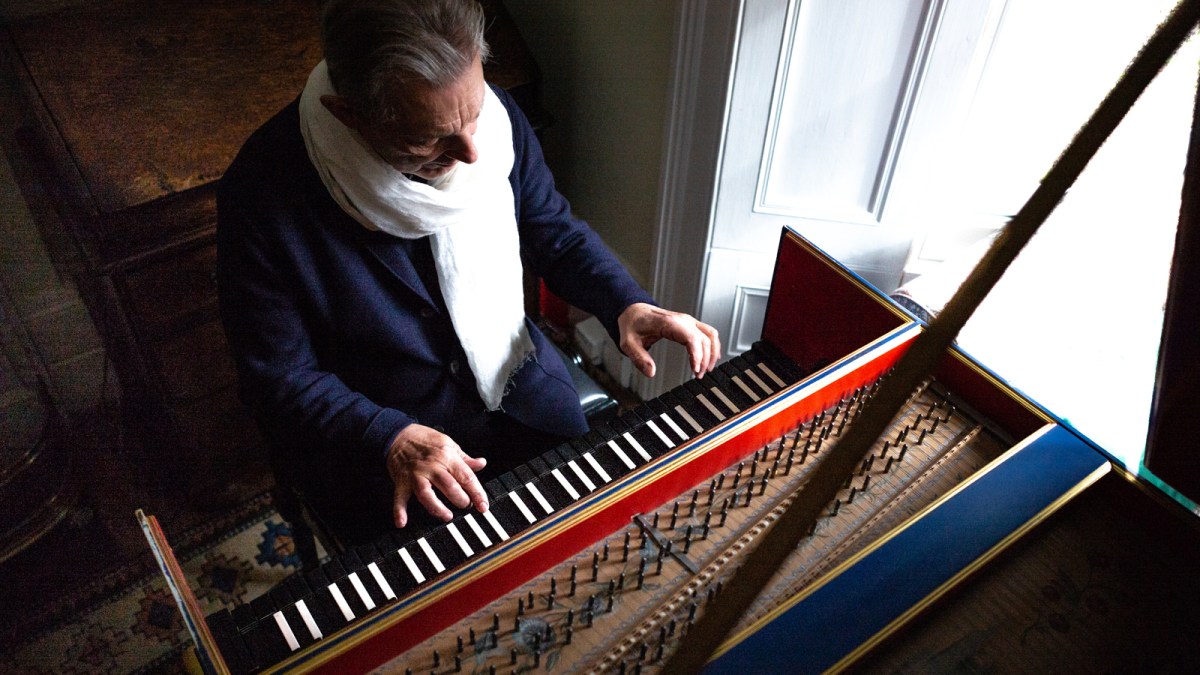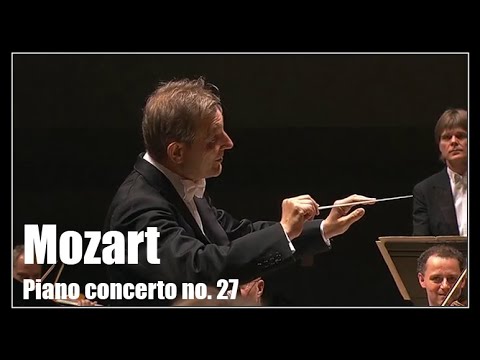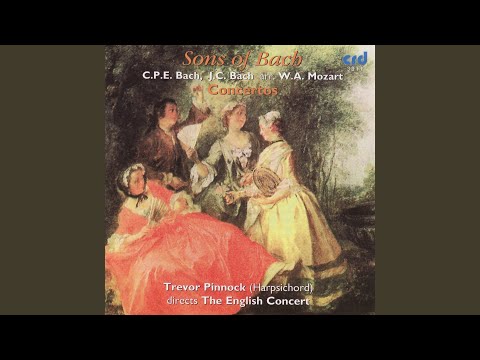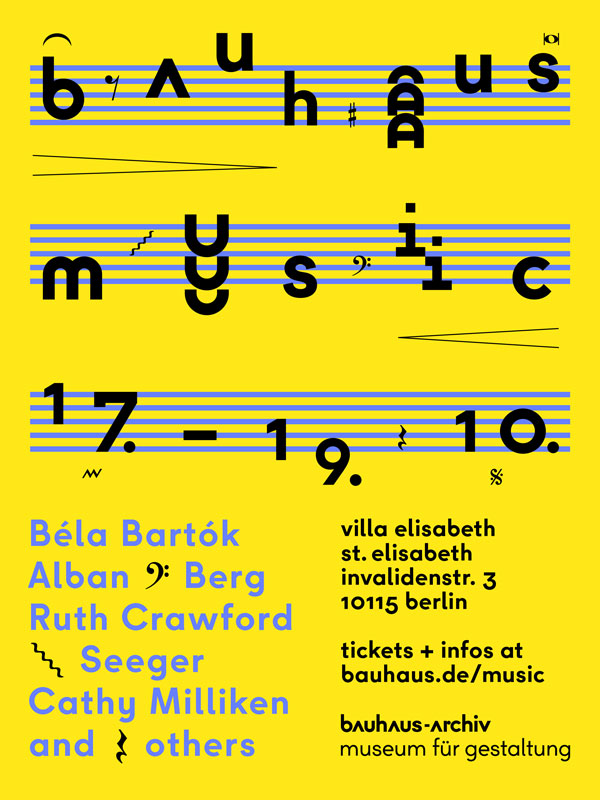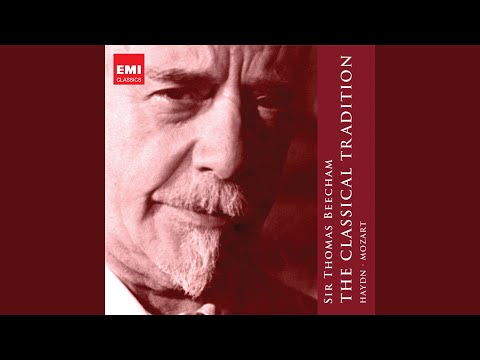I asked flutist Emmanuel Pahud what it was like working with harpsichordist and conductor Trevor Pinnock; Pahud answered that it was a gift from life. I asked soprano Carolyn Sampson; she said Pinnock is “the complete musician, combining talent, hard work, and care for the people around him.” A pioneer of the historically informed performance movement, Pinnock has been a key feature of the classical music scene for over 50 years, his influence felt far beyond the borders of the early music scene. At 77, he continues to perform and record actively, while maintaining his youthful air. His obvious curiosity, and interest in the unknown and unfamiliar, have clearly been valuable.
VAN: You said in an interview that around 1972, at the very beginning of the historically informed performance movement, larger orchestras stopped playing music from earlier periods like Mozart or Bach. How did that come about?
Trevor Pinnock: In 1972, when we started to perform period music with historical instruments on larger stages, we were considered a sort of sideshow in music-making. Nothing was taken seriously apart from by a few people. At this time, larger orchestras were programming Haydn and Mozart quite regularly. Gradually, things changed and as period instrument playing got better, symphony orchestras almost stopped programming Haydn and Mozart. That was shocking and a great pity because this repertoire was always and should be part of the artistic life of an orchestra.
Now things have changed again…
Yes, now we find ourselves in a remarkable position. A few months ago, when I went to the Orchestre National de France, I received a message from the horn and trumpet players asking whether I would mind if they played on natural instruments in Haydn, Mozart, and Schubert. And I said: “Wow! How far we’ve come when players of a symphony orchestra ask this!” This sort of spirit reflects what my hopes had always been.
So your purpose has come true?
Indeed, but we must define this purpose. This purpose was not a quest for “authenticity,” as many people think. It was a quest for discovery and adventure. For me, the idea of a voyage of discovery was always at the heart of our work. If these instruments were good enough for Bach, surely we should find out how they sounded. If I go back to that time in my mind, I see what remarkable pioneering spirit there was amongst the musicians who took part.
My generation has access to countless manuscripts, compositions and treatises online—a luxury you didn’t have…
But we could request microfilm copies and photocopies from the British Library, and we wrote a lot out by hand. I remember in 1976, I recorded concertos by Carl Philipp Emanuel Bach, and I wrote out my parts by hand and then I got a copyist. Professional copyists wrote out orchestral parts and in the most beautiful hand, something that you don’t see anymore. Also, we often played from rather bad editions, but this had the advantage of making us question everything.
You started playing the harpsichord in 1961. How did you first encounter the instrument?
I think I first saw a harpsichord when I was a choirboy at Canterbury Cathedral around the end of the 1950s. We had a concert which included some Purcell odes, and there was a harpsichord there which I was allowed to play. I found the sound of it utterly confusing! But I must have been fascinated by it. It was an instrument by Robert Goble, beautifully made, and I played a harpsichord by Goble in my first London recital at Wigmore Hall which was lent to me by the Colombian harpsichordist Rafael Puyana. It was not a historical copy though; it had seven pedals for changing the registers and making special effects—it was a well-made instrument, but not with the freedom of sound of historical instruments.
How do you define “freedom of sound”?
How can I explain… It didn’t have the splendid basses that we can find on the best historical instruments, although it had a set of 16-foot strings that gave it a certain splendor. I first came across historical instruments with my Galliard Harpsichord Trio—flute, cello and harpsichord. I used to go every week to rehearse at a collection of instruments in London at Fenton House in Hampstead. (The collection is still there.) It was there that I found my first taste for historic instruments.
Before you went to London, you attended the Canterbury Cathedral Choir School and Langton Grammar School. In Germany at least, many choir schools have come into disrepute. Has something similar happened in England?
Well, let’s say I was lucky to be a day boy so I would go home at the end of the afternoon, and lead a more normal life.
I received fantastic musical training, and I loved our daily singing work. We became professional musicians at a very young age. The disciplines of music-making were incredibly well taught.
I know many British people who can sing well, even if they’re not especially musical. Does the British music education system emphasize singing more than the German one?
Yes, but I think there is another reason for your observation. I think of the work I did with many orchestras, and the foundation of this work by chamber orchestras like The Academy of St. Martin in the Fields or The English Chamber Orchestra. Already, there was a tradition of a particular type of “English, clean” playing on modern instruments that was not as heavy as the German tradition. It was quite a contrast to hear Karl Münchinger’s Stuttgarter Kammerorchester, with its deep and heavier sound, against the lightness of the Academy of St. Martin in the Fields’s sonority. This English way became popular on the continent. I once toured with the Academy through Germany as a continuo player and can now see that it was quite a natural progression towards the historical movement which rose to popularity in the 1980s.
The latest from VAN, delivered straight to your inbox
In the ‘60s in Germany, the ideal of the Wagner, Bruckner, Brahms sound was in the air…
Perhaps that had already changed in England. Sir Thomas Beecham had done his famous recordings of Haydn at a very early stage. If you listen to them, the violin section, at least, had very good players who performed in this very English, disciplined, clean style.
Do you know where this style comes from?
I’ve often wondered about that: If some of it is tied to the Cathedral tradition of singing together. For me, it seems to be a [feature of] English training. Or perhaps it is in our temperaments—that we are good team players.
The music critic Ian MacDonald described the Langton Grammar School, which you attended, as “an exclusive, private establishment for the sons of local intellectuals and artists: Very free, emphatically geared to the uninhibited development of self-expression, a hot-bed to teenage avant-garderie.” Was it a hippie school?
Well, when I was there, the headmaster C.H. Rieu certainly encouraged self-expression, but there was also conventional structured learning.
I did not manage well at school. In hindsight I understand that I had what are now called learning difficulties, but at that time, nobody took much notice of that. So, I remember getting this sort of school report: “This boy is not capable of concentration on any subject whatsoever.” I didn’t manage to learn in a properly structured way and I have spent a lifetime working on that. So, I feel rather strongly about helping people with learning difficulties, who can’t quite be in the center of understanding the picture.
On the other hand, maybe there is some value in seeing things from an alternative viewpoint. I come from a very unconventional training. I never went to university, simply because I couldn’t get in. And most of my learning, such as it is, has had to come from my inner gift of music and responding to the music itself. So, just by immersing myself in the music, I gradually ask it to tell me what I should be doing. After that part of the process, it is essential to bring in reading and learning, especially in historical studies. I am still thirsty for knowledge and learning, but whatever I do, it comes from the heart of the music itself and my response to it. So, it is rather a private relationship, not so dependent upon ideas from outside.
I remember you advised some students: Whenever you have a fancy idea for your interpretation, imagine calling the composer and telling him about it, and then imagine what he might answer.
Absolutely. I think if you have a special idea, the thought of calling the composer and talking to him is an exercise in your own musical honesty. Supposedly you want to do some fabulous sort of ornament and you think it’s the best thing in the world—it’s a good idea to make the telephone call, because then you immediately know whether it is just a product of your ego or whether it is something you can dare to put in the music.
I tried this technique several times myself, but I never dared calling Bach.
Oh no, never! It’s impossible to call Bach, the idea of calling Bach is much too frightening. Mozart is friendly. But lately, I had an interesting experience. I heard Bach’s Flute Sonata in E Minor on the radio and I thought it was an enormously slow opening. Then I realized by the beauty of the flute playing that this must be the recording I made with Emmanuel Pahud 14 years ago. I was surprised, and I wondered if that was his speed or something I encouraged. Today, we play it a little faster. And then I thought about the long history that I have with Bach’s flute sonatas, having first played them when I was about 17, then I recorded them in 1975 with Steven Preston and Jordi Savall. Later, I recorded them with Jean-Pierre Rampal. When I first played Bach’s flute sonatas in 1960, the accepted “normal” speed was much slower. Happily Bach’s music survives the changing fashions of music making through generation after generation.
Neither Jean-Pierre Rampal nor Emmanuel Pahud are specialized in period performance. Did you ever hesitate to collaborate with them because of that?
No, I always played with musicians from different backgrounds. It’s been a remarkable thing and I learnt a lot from all the musicians.
There is one musician I wish I could have given a concert with. When I was a student, I had a girlfriend who played in a masterclass of Frans Brüggen. Suddenly he picked up his recorder and we played a whole movement together. I was in heaven!
In those days, Frans Brüggen and Gustav Leonhardt came and gave concerts with the Academy of St. Martin in the Fields on modern instruments as well as exploring historical instruments. People won’t remember how open the whole field was at that time. Somewhere, you can find it on YouTube, there is a recording of baroque orchestral music in which Gustav Leonhard plays with an orchestra led by André Rieu. Can you imagine? They were just young musicians doing their job. ¶
Subscribers keep VAN running!
VAN is proud to be an independent classical music magazine thanks to our subscribers. For just over 10 cents a day, you can enjoy unlimited access to over 875 articles in our archives—and get new ones delivered straight to your inbox each week.
Not ready to commit to a full year?
You can test-drive VAN for one month for the price of a coffee.

